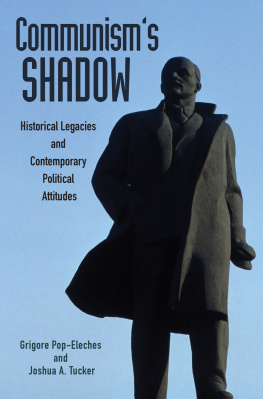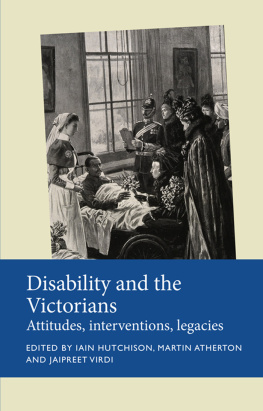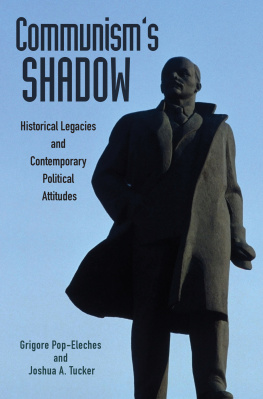Communisms Shadow
Princeton Studies in Political Behavior
Edited by Tali Mendelberg
Recently Published in the Series
Resolve in International Politics by Joshua Kertzer
Democracy for Realists: Why Elections Do Not Produce Responsive Government by Christopher H. Achen and Larry M. Bartels
Copyright 2017 by Princeton University Press
Published by Princeton University Press, 41 William Street,
Princeton, New Jersey 08540
In the United Kingdom: Princeton University Press, 6 Oxford Street,
Woodstock, Oxfordshire OX20 1TR
press.princeton.edu
Cover photograph: Chuck Nacke / Alamy Stock Photo
All Rights Reserved
Cloth ISBN 978-0-691-17558-4
Paperback ISBN 978-0-691-17559-1
British Library Cataloging-in-Publication Data is available
This book has been composed in Sabon LT Std
Printed on acid-free paper.
Printed in the United States of America
10 9 8 7 6 5 4 3 2 1
Acknowledgments
How does the past matter? Five simple words, and yet at the same time an enormously complex question. This book is motivated by an overarching desire to try to understand the answer to this question generally, but also to understand the effect of a particularly important past, perhaps the single greatest social experiment in the radical remaking of society in the modern era: Soviet communism.
Note that the question with which we begin is not does the past matter? but rather how does the past matter? We consider the former question fairly well settled: the past of course matters, and the communist past probably more so than most. But how it matters is another question altogether.
To date, much ink has been spilled on the question of how communist legacies have affected the development of post-communist institutions. When we started this project, though, there had been much less attention paid to the question of how communist legacies might have affected what political scientists call political behaviorthe way in which individual citizens interact with politics, such as by participating in politics, evaluating political institutions and actors, and forming their own opinions about political issues and topics.
While our overall research agenda has taken us in all three directions, this book is focused on the last of these topics: how might the experience of communism have affected the ways in which citizens of post-communist countries think about such fundamental issues as democracy as a form of political rule, the role of markets as an organizing principle in the economy, the responsibility of the state for individual social welfare, and the importance of gender equality in society? We were drawn to these questions precisely because it was communist legacies that we sought to examine: all these questions had important antecedents in Marxist-Leninist ideology.
Despite the importance of the topicat least in our eyes!we began the project with less of a roadmap that one normally does in political science. Therefore, we needed to put together new theoretical frameworks for understanding the potential effects of legacies on attitudes, figure out research methods that would be appropriate for testing our hypotheses, and collect what would turn out to be a great deal of data from a wide range of different sources to allow us to actually conduct our analysis. As a result, we are indebted to a large number of people who provided us with feedback as we sought to develop and refine our theoretical arguments, who critiqued our methodological choices and pushed us to further develop our techniques and statistical methods, and who assisted us with our data collection efforts. Indeed, all the survey data on which we rely for our analyses in this bookand much of the aggregate data as wellwas collected by others and provided to the scholarly community as a public good. We are so very grateful for the efforts of all those involved in these projects, without whom this research simply would not have been possible.
Let us begin first by thanking the many institutions that invited one or the other of usand occasionally both of usto present our research from this project at various stages of development: the Center for Advanced Study in the Social Sciences at the Fundacin Juan March (Spain); Central European University (Hungary); Columbia University; Duke University; ETH Zurich (Switzerland); the European Bank for Reconstruction and Development (UK); the European University Institute (Italy); Georgetown University; Harvard University; Hebrew University of Jerusalem (Israel); the Higher School for Economics (Russia); LUISS Guido Carli University (Italy); the New Economic School (Russia); New York UniversityAbu Dhabi (UAE); New York UniversityShanghai (China); Oxford University (UK); the Program on New Approaches to Research and Security in Eurasia (PONARS); Rutgers University; Universitat Oldenburg (Germany); the University of Birmingham (UK); the University of CaliforniaBerkeley; the University of Michigan; the University of North CarolinaChapel Hill; the University of Pittsburgh; the University of St. Gallen (Switzerland); the University of WisconsinMadison; Uppsala University (Sweden); and Vanderbilt University.
During these talks, we were fortunate to receive comments and feedback from more people than we can list here. With that caveat in mind, we do in particular want to thank: Laia Balcells; Pablo Barber; Mark Beissinger; Nancy Bermeo; Michael Bernhard; Yitzhak Brudny; Noah Buckley; Joshua Clinton; Michael Donnelly; Daniela Donno; Grzegorz Ekiert; Patrick Emmenegger; Zsolt Enyedi; Geoff Evans; Steven Finkel; Steve Fish; Robert Fishman; Natalia Forrat; Timothy Frye; Barbara Geddes; Anastasia Gorodzeisky; Anna Grzymaa-Busse; Steven Hanson; S. P. Harish; Tim Haughton; Jude Hays; Sarah Hobolt; Macartan Humphreys; Amaney Jamal; Andrew Janos; Krzysztof Jasiewicz; Kristin Kanthak; Herbert Kitschelt; Jeffrey Kopstein; George Krause; Alex Kuo; Jonathan Ladd; Pierre Landry; Margaret Levy; David Lewis; Oana Lup; Noam Lupu; Michael MacKuen; Anne Meng; Rebecca Morton; Ola Onuch; Laura Paler; Leonid Peisakhin; Maria Popova; Adam Przeworski; Markus Prior; Adam Ramey; John Reuter; Pedro Riera; Bryn Rosenfeld; Nasos Roussias; Arturas Rozenas; Ignacio Snchez-Cuenca; Gwendolyn Sasse; Victoria Shineman; Kathryn Stoner; Gabor Toka; Daniel Treisman; Vera Troeger; Lucan Way; Jonathan Woon; Deborah Yashar; Alexei Zakharov; John Zaller; and Liz Zechmeister.
We are very thankful as well for a number of people who patiently answered our questions and offered suggestions regarding our application of statistical methods in this book: Christopher Achen; Nathaniel Beck; Kosuke Imai; John Londregan; Anja Neundorf; Richard Niemi; and Cyrus Samii. We also want to thank the following people who provided open source modules for Stata that we utilized in our analysis: Jens Hainmueller; Raymond Hicks; and Dustin Tingley.













